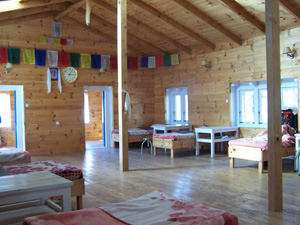 SMRITI MALLAPATY |
An ultrasound machine like the SonoSite 180 Plus can cost upwards of $14,000. It is a portable, battery-and-AC-powered, high image quality device. The 'drop-tested' SonoSite MicroMAXX, with wireless data transfer facilities, costs over $21,000. These are not devices you'd expect to find in a Nepali village.
But Phaplu Maternity Centre in Solukhumbu owns five such devices, all donated by the American company SonoSite. While pregnant women in Kathmandu pay over Rs1500 for three ultrasound visits to a health professional to monitor their baby's health and growth, pregnant women in Solukhumbu are serviced in their own villages, for free.
For almost a year now, local NGO Himalayan Health and Environmental Services Solukhumbu has run a pioneering pilot program whereby nurses from? the district hospital in Phaplu travel to all of the VDCs below Chaurikharka every three months to provide routine ultrasound check-ups.
Nurses Pema Lamu Sherpa, Sani Sherpa and Auxilliary Nurse Midwife Bhagawati Gurung walk for up to three days as is, with a SonoSite in tow, to reach their patients. The images from the ultrasound tests are stored in a computerised database for three years. First timers as well as women with twins, fetuses in breech or transverse positions, or birth complications, are referred to the hospital in Phaplu if necessary.
 SMRITI MALLAPATY The luminous interior of Suzanne's Shelter, donated by Planned Parenthood of Western Washington |
"The ultrasound program has really helped in early recognition of women at risk for difficult deliveries," says nurse-in-charge Pema Sherpa, who has herself examined over 500 women in these villages. In a recent case, she referred a pregnant Pashi Sherpa of Tingla VDC to the hospital because of the large size of her baby's head.? Pashi was then sent to the maternity hospital in Thapathali, Kathmandu, where a successful operation took place just last week.
Sonograms save lives, a luxury given that 281 out of 100,000 live births result in complications leading to the mother's death (DHS, 2006). Nationwide, only 18 per cent of deliveries take place in an institution, only 44 per cent of pregnant women receive antenatal care once and only 29 per cent receive antenatal care at least four times. The government has promised free delivery services across the country, but this remains unfulfilled.
Back in Solukhumbu, however, Gau Maya Rai of Kanku VDC has almost reached the full term of her maiden pregnancy. As recommended, she arrives at Phaplu Maternity Centre, where Pema Sherpa conducts an ultrasound scan for the size, femur length, and heartbeat of her unborn child. Here she will also receive free maternal care, including a Rs1500 transportation subsidy from the Ministry of Health and Population.
Construction for the Phaplu Maternity Centre was sponsored by the INGO Sherpa-Med Germany. The centre functions as an extension of Solu Hospital, set up in 1975 by Sir Edmund Hillary. Since July 2009, over 80 pregnant women from around the district have accessed the maternity centre's services.
For now, Gau Maya Rai awaits delivery in the luminous and spacious wood-panelled 'Suzanne's Shelter', donated by Planned Parenthood of Western Washington. Looking at her, one can't help but think these portable ultrasound machines are a perfect fit for the needs of rural communities in Nepal, who often can't access services in district headquarters. Phaplu Maternity Centre shows us what can be achieved with targeted technology transfer. But such investment will have to take place on a much larger scale if maternity services are to reach other deserving communities across Nepal.
READ ALSO:
Nursing Nepal back to health?- FROM ISSUE #489 (12 FEB 2010 - 18 FEB 2010)


